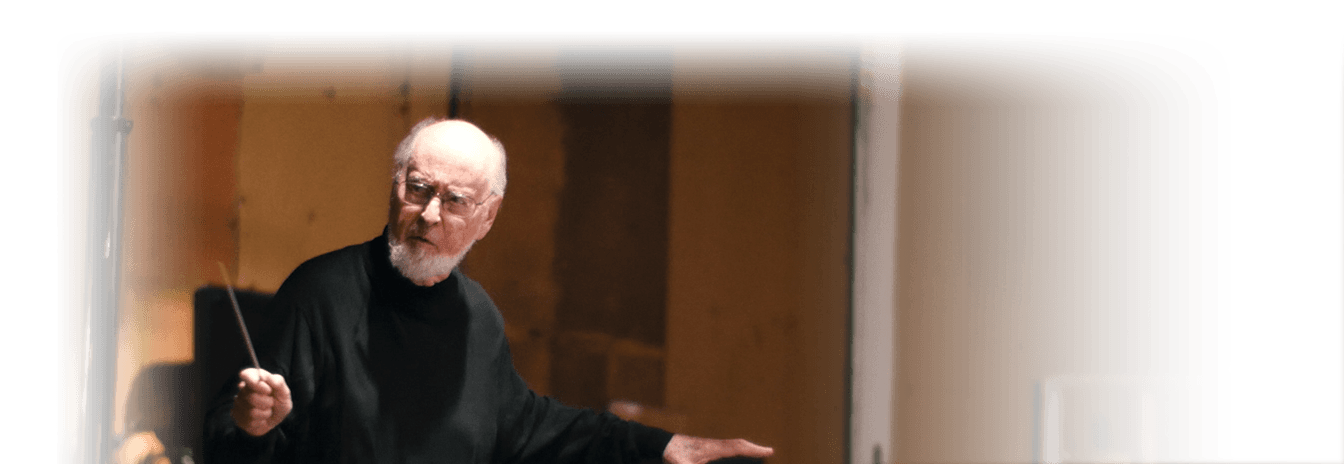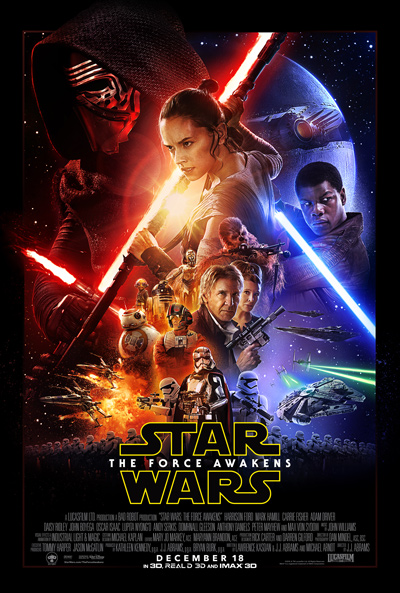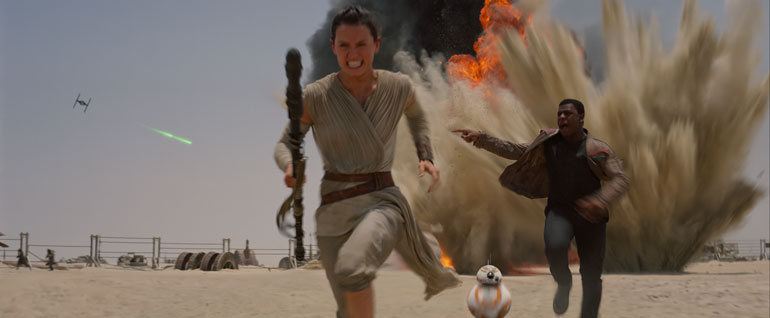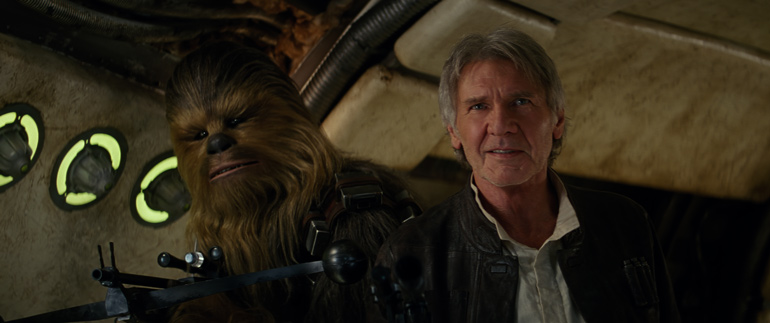
December 22, 2015 — By Juliet Simon
One can’t think of the iconic Star Wars saga without instantly conjuring the unforgettable scores that are as integral to the series as its beloved characters and good versus evil storyline. John Williams, the masterful composer behind the series’ enduring music, is now taking on the seventh installment, Star Wars: The Force Awakens, which opened in theaters nationwide on December 18, 2015, earning roughly $517 million in worldwide ticket sales in its first weekend, breaking multiple box office records.
Unequivocally the most recognized and decorated living composer of film music in modern history, Williams’ illustrious career spans six decades and many of the most celebrated and best-loved scores, including Jaws, the Indiana Jones series, Close Encounters of the Third Kind, Superman, Schindler’s List, and the first three Harry Potter films, among many others. Notably, the longtime BMI affiliate has composed music for all but two of Steven Spielberg’s films, and is currently working on the director’s next project. Widely honored, Williams’ body of work has resulted in 5 Academy Awards, an astounding 49 Oscar nominations, 4 Golden Globes, 22 GRAMMYs, and BMI’s Richard Kirk Award for outstanding career achievement.
What defines a John Williams’ score? Lushly orchestrated, it conveys the emotion and action of a film’s narrative and adds an indelible sonic dimension. Safe to say, as much as you remember Darth Vader surveying the fleet on the Imperial Star Destroyer between mechanical breaths, you can’t forget “The Imperial March.”
BMI had the opportunity to speak with the renowned composer about scoring The Force Awakens, working with director J.J. Abrams, his advice to aspiring composers and much more.

You’ve been involved in the Star Wars saga from the very beginning. Did you ever think, when you were scoring the original, that it would have the enduring impact it has had and that you would be scoring another chapter in the series nearly 40 years later?
Well, when we did the initial recording in London in 1977, I didn’t have any inkling that there would be a second film, and George Lucas, who has created all this, as you know, didn’t tell me or, as far as I know, anybody else, if there was going to be a second film or, let alone, a third film. I thought that it was a great film and that it would be a wonderful sort of Saturday afternoon show for the family, and then in a few weeks it would be gone.
And, of course, what happened, we remember, is that it ignited in some way. The wonderful historian Joseph Campbell explained to us all about the interrelatedness of the mythological elements of the story that struck the psyches of people worldwide. But that came later. I certainly didn’t have that feeling at first, and I don’t think anyone on the production did, really, until the magnetism of the piece itself was so powerful and so appealing to people, maybe billions of people by now.
The opportunity to do now seven of them is probably unique in the history of film. I’m just lucky. To be able to work for nearly 40 years, off and on, on the same subject and to be able to add themes and musical material to the glossary of themes that went before and try, as I have tried in the new film, to keep it organically related, is not only a unique challenge but tremendous fun. And I feel very privileged to have that very special, unique opportunity after 40 years, and to have the energy to do it. I feel nothing but great good fortune.
“The wonderful thing about J.J. Abrams, just one of his many wonderful qualities, is that he is very appreciative of George’s [Lucas] legacy and has been very careful to forge a tapestry that’s strongly related to the originals, which he has done. But at the same time he has freshened it and rejuvenated it and revived the whole concept...”
How do you compare working with J.J. Abrams today to working with George Lucas in the ’70s?
I’ll tell you a little bit about that. We wouldn’t be having this conversation if it hadn’t been for George Lucas’ creation of Darth Vader and Yoda and Luke Skywalker and all the rest of it. J.J. Abrams, who is the new young director of the new film, has done a brilliant job, I think. The wonderful thing about J.J. Abrams, just one of his many wonderful qualities, is that he is very appreciative of George’s legacy and has been very careful to forge a tapestry that’s strongly related to the originals, which he has done.
But at the same time he has freshened it and rejuvenated it and revived the whole concept by bringing in a fabulous young cast that is energetic, and the dialogue is witty and fast and perhaps more contemporary in the way it strikes a sensibility. But we also have Carrie Fisher and Harrison Ford doing a wonderful job. So you have a kind of new and old generation working at once in a fantastic way, a wonderful chemistry, and fabulous comedy timing and action acting, if you can put it that way, the always-difficult task of doing action and comedy together.
But George Lucas and J.J. Abrams have very different working styles. With George, who grew up with thirty-five millimeter film… George’s editing was constructed almost like Hitchcock. I mean the edit that I received was the edit we scored.
In the case of J.J. Abrams, he is a young man, still under 50, and he has grown up with Pro Tools and Avid and all the rest of these electronic and technological aids that people have now. And so his editing process is very different. We were making changes up till the very last minute, and because of this, we recorded with the orchestra sporadically through the months of June to November, which we never did with George. With George we always recorded the scores in seven or eight days running. So the process was markedly different in that respect. J.J. made, with great facility, a lot of changes all the time and they were always improvements. And we were glad to see them because he knew what he shot; we did not. We only knew what we had seen.
And so I guess you could say that it was almost like working with two different generations of varying technologies. We know George for the wonderful creator, philanthropist, and the serious man that he is. J.J. Abrams is a fabulous person. He is warm and extremely smart, with a beautiful family. He is someone I hope that the public will get to know because he is a very, very valuable man who will have a fantastic and long career.
What can we expect from the music in The Force Awakens?

Well, there’s about two hours of music in it. Maybe more. We actually recorded about three hours, believe it or not, one version or another of this cue or that. There are a variety of new themes, a theme for the character of Rey and a theme for the character of Kylo Ren and a march of the Resistance, the Resistance being in this case the Jedi, the forces of good, and other pieces of material relevant to various characters. And interspersed with that are references to Princess Leia’s Theme and the Force Theme itself.
“I hope people will find that the music is fresh and new and at the same time, interrelated with earlier material that we have come to know and perform so much.”
How did you approach the score this time?
The approach is always pretty much the same for me. It’s a working life, as you know, in music. I have done a lot of films and a lot of other composing, various projects in the interim years, but when I have come back to the Star Wars films or, for that matter, Indiana Jones where we’ve done four of them, I always felt that it was kind of like getting back on your teenage bicycle that you haven’t forgotten how to ride it at all, and it takes a few hours to get back in the swing of whatever the modalities are of that particular project.
I have felt that it’s been a long continuum that has been uninterrupted. Or if it has been interrupted by other projects, I seem to be able to jump back on the horse and enjoy what I am doing. I hope people will find that the music is fresh and new and at the same time, interrelated with earlier material that we have come to know and perform so much.
In your words, what dimension does music add to film and why do you choose this route of artistic expression?

Pictured: John Williams conducting a scoring session of Star Wars: The Force Awakens.
I think the contribution of music to film is something that is immeasurable and we really can’t quantify that. I think what we have discovered is that music and film can’t be separated. You could illustrate that by simply saying that in the silent film days, they really weren’t silent - we had a pianist or a violist or an organist playing some music so that the film was not ever truly silent.
And some films, like Star Wars, will have music almost entirely in them. If a film is two hours long you have two hours of music. In this case, there are some minutes without it but not very many. There are other films that may have only 15 minutes of music, yet those 15 minutes are essential to the emotional connection between the audience and the story.
I think it’s impossible ever to measure it, but music and film are sister arts that live together and depend on each other. As for why I’ve chosen this particular field, I would say initially for very practical reasons. But what’s more interesting to me is that because of this symbiotic relationship between music and film, we will continue to hear wonderful film music in the future. There will be young generations coming along, countlessly coupling audiovisuals together in imaginative ways. And we’re seeing it already.
You know, film music is only what, 70, 80 years old? It’s in its infancy still. Initially when I went into it, I played piano in studio orchestras for a lot of very distinguished composers, and it was a natural progression for me to go from playing the piano in their orchestras to orchestrating material and finally being invited to compose scores of my own. So my own working career in practical terms and in terms of proximity, because I’ve lived in Los Angeles, drew me, I suppose, inexorably towards working in film.
Going back to Star Wars, which character is your favorite?
I have always loved Yoda. There is a new character in the new film, she’s called Maz, who is a Yoda-like character who is thousands of years old and full of wisdom and empathy, if you like. I really have enjoyed all of them. Of course Darth Vader on the other side of things, and the new villain is called Kylo Ren, who you will get to know and see. He’s played by Adam Driver, a young actor, who gives a fabulous performance. It’s one of the memorable characters certainly fresh in my mind. Harrison Ford has always been fabulous in this series also. I can say he is wonderful in this new film. His comedy timing is so impeccable.

How much collaboration goes on between you and the director, in this case, J.J. Abrams?
Oh, a lot. We had one meeting at the piano where I played him themes and he seemed to be very happy with them. And then we had our recording sessions with the orchestra and he always had wonderful ideas and he would sometimes change scenes and make suggestions for the music.
He was a great collaborator and great partner. I would play him a certain theme and he would be very enthusiastic about it, and he would say we should use that in this scene and that scene. And I have to tell you his guidance was fabulous. If you think the music is good in the film, a lot of it has to do with the empathy we shared together and with his very, very good ideas. Particularly in the beginning of the process, when I was working on the earlier reels, he was with me on that but he also knew the later reels which I did not at the time. So he began to guide me towards developing a theme that would eventually mature in reel seven or reel eight — scenes that I may not have yet seen at all or at least not in their entirety at that point.
So over a period of really close to nine months, we were very, very closely collaborating. Mostly talking, not at the piano. I always spend a lot of time at the piano with Steven Spielberg. But J.J…. we spent most of our time together at Sony Studios, where we recorded. He was a great help. He is very musical and has a wonderful sense of rhythm and dynamics. So he was a great partner.
How would you say your creative process has evolved throughout your career? Has it changed for you throughout the years?
I don’t think so. I think to a degree, I feel unchanged, but on the other hand, to be unchanged is to be unimproved. I’d like to think that now I probably know more about music and certainly about conducting because I conducted so many years with the Boston Pops Orchestra. I did so much live performance, especially in Boston but also elsewhere, that I began to have a different, and maybe more sophisticated, feeling about the orchestra and its way of breathing, its way of moving and so on. And that’s a subtle thing but I think I’m, in my mind as I am writing, much more of a conductor than I was before.
I still use the piano, I still use a pencil and paper; I have not evolved to the point where I use computers and synthesizers. First of all, they didn’t exist when I was studying music and luckily, mercifully, I have been so busy in the interim years that I haven’t had time to go back and retool. And so my evolution, in very practical terms, i.e. piano and pencil and paper, has not changed at all.
Is there a score from your prolific career that you are most proud of?
The whole body of what I’ve been doing is still to me a very organic thing. It’s a process that’s going on and nothing really seems fixed to me. I’m fixed on what’s on my desk and what is in front of me. Star Wars is done; I’m now working on Spielberg’s new film. I think it’s probably better to let others judge the quality or the effectiveness of this or that score, if it has any at all.
We are living in a world where we’re standing on shoulders that are unmatchable, especially in music. I mean the masters that have lived before are almost unapproachable in their inspiration and their technique. So we just have to work harder and contribute what we can.
“I never would’ve imagined that I’d have the opportunities I’ve had. And young people can’t possibly imagine how far and how high their efforts can reach.”
Is there a lesson you’ve learned over your career that could benefit film composers who are coming up in the field today?
The lesson I would probably offer anyone is to not call themselves a film composer but to call themselves a composer, and to compose for the theater, compose for film, compose for the church or the synagogue or educational music or instrumental, choral, secular, or religious music. Whatever they do; the ballet, and the theater certainly. Film is one thing that we do, and it’s good for young composers to know how to do that and desire to do it and find work doing it if they can.
But I think they should think of themselves in a broader sense because film music is restricting in many ways. You’re subjugating yourself to a soundtrack filled with sound effects and dialogue and other things that are in many ways equally important. Most of the great composers in history also have been great performers. So I think attending as many performances as one can is important. If one can play or sing, one should play and sing. If one can conduct, one should do that also. I guess that would be my singular first step in trying to advise anyone.
Life is so quixotic. I never would’ve imagined that I’d have the opportunities I’ve had. And young people can’t possibly imagine how far and how high their efforts can reach. All they can do is continue to work as hard as they can, learn as much as they can and not stop working. The process is the process. The joy of it is doing the thing itself.
You mentioned working on the next Steven Spielberg film. Can you tell us a bit about that project?
It’s called The BFG, The Big Friendly Giant. Based on the book by Roald Dahl; people who have young children will particularly know about that. We actually worked on it, just yesterday and today. And after this phone call I’m going to go and begin on reel one and that will be the rest of my day. And this is also, I think, the twenty-eighth film that Steven and I have done together. We’ve been working together since 1973. I mean, it’s amazing. I think he has done one or two films that I have not been able to do, but it has been more like a marriage than a working relationship. And we are also very good friends. We share offices very near each other. It’s been a great joyous ride with him.
“BMI has been brilliant in the work that it does, not only for me and for other composers but for music in general, which is the thing that we all want to continue to nourish. It has been good to all of us and given us our lives. So BMI is an enormous contributor to the vitality of the life of music itself, and I can only be grateful to this great friendship that I have had.”
Could you tell us about your relationship with BMI?
I joined BMI in 1960. Dick Kirk was the BMI executive who came to California in those years, and did such a great job on behalf of BMI, and after him Thea Zavin. They were the two principal energizers, let me put it that way, of BMI at that particular juncture in its history, who met me and other young composers here and convinced us that we should be with BMI, that our work in film and in television would be more properly represented with BMI than with other performing rights organizations. And so I thought that was right and I had advice from other people here, particularly Lionel Newman, and also Stanley Wilson, who are both people that I worked with at that time. It helped me to make the decision that BMI was best for me.
And it has been a wonderful relationship for all of those years. BMI has been brilliant in the work that it does, not only for me and for other composers but for music in general, which is the thing that we all want to continue to nourish. It has been good to all of us and given us our lives. So BMI is an enormous contributor to the vitality of the life of music itself, and I can only be grateful to this great friendship that I have had.
One last question: Were you surprised when you found out that Darth Vader was Luke’s father?
I was! And I was initially surprised when Luke and Leia were brother and sister. These are some of George Lucas’ well-kept secrets and he was right to keep them. So it kept us in the dark. There are surprises in the new film too that people will experience…and I hope they’re going to be happy. I think they will be, and I hope everybody who sees the film will have a fraction of the fun that we all had in making it.
Images ©2015 Lucasfilm Ltd and TM